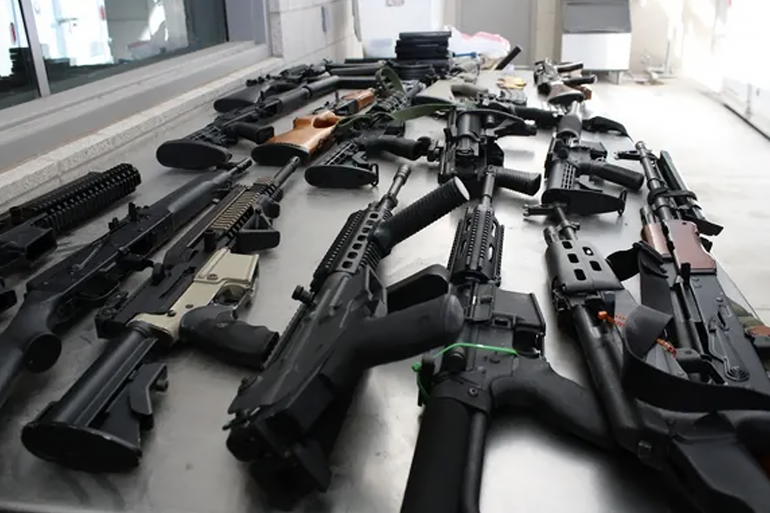
The U.S. Attorney’s Office for Arizona is not prosecuting straw-purchase arrests with speed and vigor. That can allow weapons purchased illegally in the United States to “walk” across the border into Mexico, according to a retired ATF deputy assistant director who blew the whistle the first time this happened, in what became known as ATF’s “Operation Fast & Furious” scandal.
Peter J. Forcelli said the U.S. Attorney’s Office in Phoenix, which is overseen by U.S. Attorney Gary M. Restaino, suffers from a “culture of laziness and ineptness and a fear of getting beaten in court.”
Forcelli served at the Phoenix ATF Office from 2007 to 2011 before working his way up to a series of senior positions. He said Restaino’s office has long had a reputation for being “among the worst U.S. Attorney’s offices to deal with in the country.” Today, he said, little has changed.
According to Forcelli . . .
The U.S. Attorney is turning a blind eye to straw purchases, which is fueling what’s going on in Mexico. The prosecutors who work there haven’t changed their ways. They have a habit of kicking the can down the road and not taking straw purchase cases. These are not purchasers who are buying guns for target shooters. These are guys who are sending guns to Mexico to slaughter human beings.
The Mexican government sued several American firearm manufacturers arguing that the Protection of Lawful Commerce and Arms Act (PLCAA), which shields gunmakers from liability if their products are used in the commission of a crime, does not apply. Last month, a three-judge panel of the First U.S. Circuit Court of Appeals overturned a ruling from a lower court, which dismissed Mexico’s lawsuit after finding it violated the PLCAA.
In October 2021, President Joe Biden nominated Restaino as U.S. Attorney for the District of Arizona. In April 2022, Biden appointed him as acting director of the ATF – a temporary position Restaino held for nearly three months after Biden’s first attempt to shepherd his pick for ATF director, David Chipman, imploded during the Senate confirmation process.
Forcelli was a homicide detective for the New York Police Department before joining the ATF as a special agent. After serving at ATF’s Phoenix office, Forcelli rose through the ranks eventually becoming a deputy assistant director, where he was in charge of ATF operations for the Eastern United States. He has held leadership positions within ATF in Phoenix, Canada, Miami and at ATF Headquarters. He served as ATF’s head of training before retiring in October 2021.
Forcelli has written a book about his experiences titled The Deadly Path: How Operation Fast and Furious and Bad Lawyers Armed the Mexican Cartels, which will be released by Knox Press on March 5, and is now available for presale on Amazon and other retailers. The book details how he blew the whistle and paid a steep price for it.
Forcelli said the misconduct occurring in Phoenix mirrors the misconduct he witnessed during ATF’s original gunwalking scandal, Operation Fast & Furious, in which the Arizona U.S. Attorney’s Office and ATF’s offices in Phoenix and Tucson intentionally allowed Federal Firearm Licensees to sell weapons to illegal straw purchases from 2006 to 2011.
ATF claimed they hoped they could track the weapons to Mexican drug cartel leaders, but by 2011 none of the cartel leaders had been charged. However, the weapons surfaced at crime scenes involving the deaths of hundreds of Mexican nationals and the 2010 murder of Border Patrol Agent Brian Terry.
Forcelli doesn’t have much of a history with U.S. Attorney Restaino. “I never dealt with him in Phoenix. He was there during Fast & Furious, but wasn’t part of the case,” Forcelli said. “I have heard he’s personable and a likeable guy, but not a ball of fire.”
Forcelli said when he testified before Congress about Fast & Furious, then-Congressman Trey Gowdy, himself a former federal prosecutor from South Carolina, questioned him about the Arizona U.S. Attorney’s hesitancy to allow proffers, a standard legal tool that allows a suspect to offer some information so law enforcement can determine whether they want to extend formal cooperation in exchange for more information.
“They were sheepish about straw purchases and very hesitant to proffer anybody,” Forcelli said. “After I got back to Arizona, a supervisor from the U.S. Attorney’s Office literally met with me to redefine their definition of a proffer.”
Little has changed since he worked in the Phoenix office, Forcelli said.
“They still don’t decline cases in writing. The declinations are made verbally. If the shit hits the fan, they can deny it. That’s the scam they pull,” he said.
Forcelli explained that ATF cases are presented to prosecutors in blue binders known as “blue jackets.”
“One sat on an AUSA’s windowsill for over a year in the Phoenix sun until it was bleached white,” he said. As a result, Forcelli said some ATF agents would ask the Maricopa County Attorney’s Office to prosecute their cases.
“Special agents can’t be successful without a partnership with prosecutors,” Forcelli said. “If the agents are constantly told no, they can’t meet their full potential.”
No comment
Neither U.S. Attorney Restaino nor his spokespersons returned calls or emails seeking their comments for this story. In fact, no one involved in Arizona law enforcement was willing to comment about Forcelli’s allegations.
The National Border Patrol Council, the union for more than 18,000 Border Patrol Agents, didn’t return emails seeking comment.
Sgt. Joaquin Enriquez, a public information officer for the Maricopa County Sheriff’s Office said in an email, “I will need to do some research on this, but I will get with our detectives and get back to you.” No subsequent emails were received from Sgt. Enriquez.
The Maricopa County Attorney’s Office, which is the third-largest public prosecutorial office in the country, did not respond to calls or emails seeking comment.
Forcelli drew a sharp distinction between ATF special agents and their Industry Operations Investigators, or IOIs, whom the Biden administration weaponized as foot-soldiers in his war against federal firearm licensees.
“During my roughly 27 years with the ATF, I only met two special agents who I would say were anti-gun,” he said. “David Chipman was one of them.”
The Second Amendment Foundation’s Investigative Journalism Project wouldn’t be possible without you. Click here to make a tax deductible donation to support pro-gun stories like this.
This story is part of the Second Amendment Foundation’s Investigative Journalism Project and is published here with their permission.


